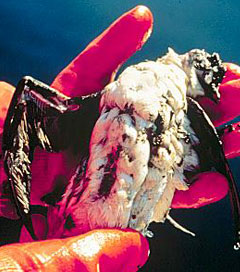In early October, BP and its contractors Transocean and Halliburton, were cited by the Interior Department for their negligence in the Deepwater Horizon spill in the Gulf last year.
According to the Bureau of Safety and Environmental Enforcement (BSEE), the companies have 60 days to file appeals before any penalties are imposed against them.
Also see: “Oil Spills Are Forever: Activists Fight to Hold Exxon Mobil Accountable in Alaska (Part One)“
The main voice opposing the “slap-on-the-wrist” measures against BP is US Rep. Edward Markey, who calls for stronger penalties. Under law, fines are capped at $35,000 a day, per incident for the violations, which Markey estimates to be just seven hours worth of BP's profits.
“That fine obviously does not even begin to approach the amount needed to be a deterrent against a repeat of this tragedy. That fine is a slap on the wrist,” Markey said.
However, the citation for BP appears to be more of a warning measure, as Michael Bromwich, head of the BSEE, also said that it wouldn't be appropriate to completely ban BP from offshore drilling.
“The question is, 'Do you administer the administrative death penalty based on one incident?' and we've concluded that's not appropriate,” Bromwich said.
Incidentally, just last week, the Department of the Interior gave its first approval of a Gulf oil exploration plan submitted by BP.
Furthermore, the same agency responsible for issuing drilling permits to BP, the BSEE, has also allowed BP to participate in an upcoming oil lease auction for the Gulf in December.
Deepwater Horizon Disaster's Lingering Effects
It has been a year and a half since the Deepwater Horizon spill in the Gulf of Mexico, yet the effects of the environmental disaster are still being felt – both by the nonhuman ecosystems directly affected and by coastal residents who depend on the waters for their livelihoods.
According to a recent report in The New York Times, shrimpers in southeastern Louisiana have called this year's white shrimp season the “worst in memory,” with some fishermen claiming an 80 percent loss this year.
While the poor shrimping season has been attributed to many factors, research at Louisiana State University (LSU) points to lingering effects of the BP oil spill. Joris L. van der Ham, a researcher at LSU, said his findings are not yet complete, but suggest that compounds in the oil may have stunted the shrimp's growth rate.
Another recent study put out by the same university finds that certain fish species in the Gulf that have been exposed to the oil have shown signs of cellular damage that could impair reproduction.
Furthermore, low doses of the toxic oil compounds can have longer-lasting effects, which may take months or even years to manifest themselves, as we saw with the herring fishing collapse four years after the Exxon Valdez spill in Alaska, which to this day remains debated as a definitive cause of the species collapse.
Government and industry officials have repeatedly come out with reports that find the seafood in the Gulf “safe to eat.” However, a recent study by the journal Environmental Health Perspectives found that the Food and Drug Administration's (FDA) quick reassurance of Gulf seafood safety was based on flawed analysis, leading to human consumption of seafood contaminated by as much as 10,000 times the FDA-approved “safe” level of toxicity.
Miriam Rotkin-Ellman, a staff scientist at the Natural Resources Defense Council and co-author of the study, acknowledged two areas of concern: the accumulation of the contaminants within the tissue of the shrimp and the effects the toxics have on the affected species for both survival and reproduction. Both factors appear to come into play when it comes to health implications for consumers of the seafood.
“It is difficult to say how long the contamination will last,” Rotkin-Ellman said. “The polycyclic aromatic hydrocarbons (PAHs) could take ten years to break down.”
She avers that even though the BP oil spill is unprecedented in the Gulf, the science is available that can effectively study and monitor the effects of the spill on the ecosystem. She also said that this erroneous information from the FDA is not an anomaly.
“The FDA shows a pattern of flawed regulation; it turns a blind eye to contamination and chemicals in many foods and consumer products, from pesticides to hormones to additives,” Rotkin-Ellman said.
Speaking against the authoritarian crackdown
In the midst of a nationwide attack on civil liberties, Truthout urgently needs your help.
Journalism is a critical tool in the fight against Trump and his extremist agenda. The right wing knows this — that’s why they’ve taken over many legacy media publications.
But we won’t let truth be replaced by propaganda. As the Trump administration works to silence dissent, please support nonprofit independent journalism. Truthout is almost entirely funded by individual giving, so a one-time or monthly donation goes a long way. Click below to sustain our work.
